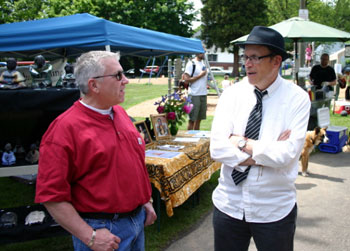
Paul McIvor, who participates in meditation groups in Canada's largest prison near Toronto, offered results of his study of Buddhist prison volunteers.

Resistance and Surrender: Prison Dharma Conference 2010
The Northwest’s 3rd annual Prison Dharma Conference took place the weekend of June 4-6 at the Portland Insight Meditation Center. The event is an opportunity for people who lead meditation or dharma groups in prison to network with each other, learn about what’s going on in other areas, and share ideas and practices. Co-sponsored by Plum Mountain Buddhist Community and the Northwest Dharma Association, this year’s gathering offered information about prison volunteers themselves, as well as insight into the boundaries, differences, and commonalities among people inside and out.
Conference organizer Kobai Scott Whitney, spiritual director of Plum Mountain and author of Sitting Inside: Buddhist Practice in American Prisons, started off the conference with a Friday evening presentation on “Compassion and the Passions in Prisons”. He stressed the importance of maintaining skillful boundaries with inmates, a process of negotiation that involves being aware of sexual energy in the prison environment. His talk included advice on how to avoid common mistakes that some volunteers make.
In his talk entitled “Resistance by Other Means”, Paul McIvor, M.A., a Toronto-based prison volunteer and researcher, presented the results of his master’s thesis study on Buddhist prison volunteers in the United States. He found that in the sample he interviewed the majority of volunteers had practiced 20 years or more, more than half in a Japanese Zen tradition, and held leadership roles in their sanghas. In contrast to the American prison population, they were likely to be white and educated, and 50% were female.
They tended to cluster in either the 30’s or over-50’s age groups and many had been involved in some kind of social or political action (e.g. civil disobedience) in either the 1960’s or ‘70’s, or the late 1990’s-2000’s, depending on their cohort. Though 20% declined to answer, the remainder of those sampled tended to classify themselves politically as “left” or even “far left”.
Many volunteers felt that doing prison dharma work enhanced their own Buddhist practice, citing exposure to inmates’ questions and their ways of responding to prison life as valuable rewards for volunteering. Another motivator was the opportunity to “witness a transformation” in inmates who undertake dharma practice.
McIvor hypothesizes that in addition to acting out of simple altruism and/or benefiting from a reciprocally valuable relationship to dharma practice with inmates, Buddhist prison volunteers are, to greater or lesser extent, engaged in resistance to authoritarianism and oppression as represented by the prison system. This Buddhist approach to dissent sidesteps the oppositional model of the dominant culture, thus offering “resistance by other means”.

Doug Waddington, left, Superintendent of Washington Correctional Center, and Kevin Griffin, Dharma teacher and author, visited the Portland Buddhist Festival in Colonel Summer's Park.
Later Saturday morning Ven. Thubten Tarpa of Sravasti Abbey and Genko Rainwater of Dharma Rain Zen Center spoke and answered questions about their experiences in Washington and Oregon prisons. A topic of particular interest was whether or not incarcerated practitioners should be encouraged, or even required, to disclose the crime for which they were sentenced.
Ven. Tarpa stressed the value of helping people distinguish remorse or regret from guilt. While remorse concerns a specific action that took place in the past, which one wishes to overcome and not repeat, guilt is more self-centered and involves feeling bad about oneself. Buddhist psychology teaches that remorse is useful and valuable, but guilt is less so. Prisoners are encouraged to clearly see harmful actions and express remorse but not to wallow in guilt. She demonstrated a chanting practice used to separate remorse from guilt.
The conference’s afternoon speaker was Kevin Griffin, author of One Breath at a Time: Buddhism and the 12 Steps and A Burning Desire: Dharma, God and the Path of Recovery. (In conjunction with the conference Griffin also gave a public reading in the evening. See related article: Higher Power: Buddhists, “God”, & the 12 Steps. A practitioner and teacher of insight meditation in the Bay Area and himself a recovering alcoholic, Griffin applied the model of recovery from addiction to the broader effort to transcend suffering in general, whether experienced by those inside prison or out.
“Being present,” he said, “is the hardest thing to teach people who are in the midst of suffering and looking to get out.” Transformation begins by making a commitment to respond to the present moment and then undertaking to live a moral life. This is the essence of what in 12 Step programs is known as “surrender”.
In a follow-up discussion Doug Waddington, Superintendent of Washington Correctional Center (WCC) in Shelton, commented that “surrender” is not an intuitive response, especially for the prison inmates he supervises. He and others talked about how difficult it is in the prison environment to express kindness and compassion without becoming, or fearing to become, vulnerable. A workshop held at WCC helped inmates learn how to write letters of gratitude in preparation for an event, “Honoring Significant Women”. They also had the option to take waltz lessons. A string quartet played at the celebration.
On Sunday morning, the last day of the conference, the format was more casual. The group had time to discuss issues in a more freeform way and talk about some of the politics around prisons and sex offenders in particular. The conference concluded with a circle of metta. Participants each rang a gong and offered lovingkindness to the many different people affected by the prison system and oppression in general.
General information on this subject can be found on the Prison Dharma Network site: www.prisondharmanetwork.org.
For more information about Plum Mountain Buddhist Community, please visit: www.plummountain.org.
Contributors: Jeff Kerr, Julie Welch.
Photos: Lenny Reed.